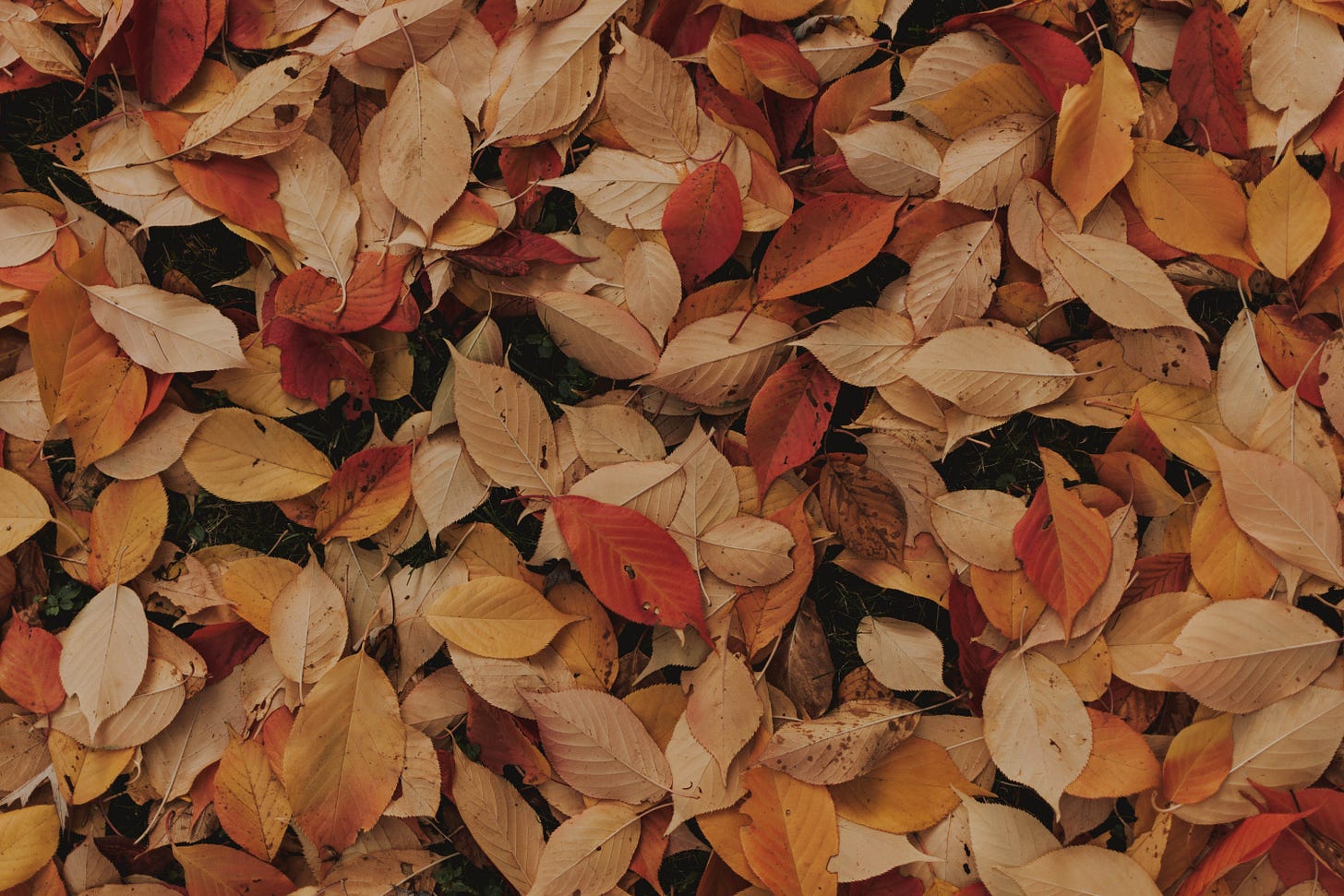Mindful Spending: A Path to Unexpected Prosperity
Taming the wanting mind
Hello & welcome to another edition of Beyond Self Improvement! Last Wednesday, I published Breaking Free From Taking Things Personally.
Welcome to the 6 new Beyond Self Improvement people who have subscribed since last Wednesday! 🥳 If you haven’t already, join 659 thinkers & spiritual seekers in 54 countries now:
The Article In Three Sentences
Chasing material goods often leads to a cycle of unfulfilled desires and financial strain. Mindfulness helps us distinguish true needs from fleeting wants, bringing balance. This shift helps foster deeper contentment and greater financial well-being.
Dear Friends,
Happy Thanksgiving to those in the U.S., and happy Thursday to everyone else across the globe!
Have you ever wrestled with wanting nice things and financial freedom simultaneously? I have.
In my family, image was (almost) everything. We lived in a stone house in a suburb of New York. My dad drove a vintage red Mercedes convertible, a gift to himself for turning forty. “Are you a doctor?” someone once asked as he backed out of the driveway, a beautiful wife next to him and four kids, all dressed nicely, squeezed into the back.
When I was in school, I couldn’t wait to get out to buy what my older sister had—a house in the suburbs, a cool car, a comfortable sofa, and a big TV. When I graduated, I rented an apartment in the Minneapolis neighborhood of Linden Hills, a few blocks from the lake. I bought furniture and a wireless phone and built a rack to hang ties. I wore suits to work paired with wingtips and an overcoat. I bought a used Porsche, a windsurfer, and a car rack. With the look complete, I was finally living the good life, or so I thought.
I witnessed this same pattern in my stepson, Preston. At fourteen, he began obsessing over a pair of soccer cleats, which quickly extended to gaming computers, pants, jackets, shirts, and an endless array of shoes, one after the other.
But all my wanting and spending clashed with my dad’s advice to “pay yourself first.” If you’re human, inevitably, you will have been confronted with the often all-consuming desire for material goods. Mindfulness teacher Jon Kabat-Zinn offers an illuminating story on this matter.
“They say that in India there is a particularly clever way of catching monkeys. As the story goes, hunters will cut a hole in a coconut that is just big enough for a monkey to put its hand through. Then they will drill two smaller holes in the other end, pass a wire through, and secure the coconut to the base of a tree. Then they slip a banana inside the coconut through the hole and hide. The monkey comes down, puts his hand in, and takes hold of the banana. The hole is cleverly crafted so that the open hand can go in but the fist cannot get out. All the monkey has to do to be free is to let go of the banana. But it seems most monkeys don’t let go.”
So what are we to do?
𑁍
The human realm, often called the 'realm of desire,' runs primarily on wants, not needs.
We must develop a wise relationship to desire if we want inner well-being and freedom. Instead of trying to eradicate desire, we have to understand it. Rather than stopping what we’re doing, we need to become aware of the mechanisms of the craving mind and our patterns of wanting.
We start by bringing awareness to our desires, observing them without condemnation or getting entangled. As our understanding develops, we see that wanting creates tension and is often painful, arising from a sense of longing or incompleteness.
We begin to distinguish between healthy and unhealthy desires—those that lead to well-being and those that lead to suffering. Nonjudgmental awareness helps us see this distinction and offers us a choice.
Closer observation reveals that desire is fleeting and insubstantial, often a form of imagined satisfaction that consumes us. It feels real, but it's akin to an intoxicant, closing our eyes to everything except the fulfillment of that desire.
By stepping back and viewing our desires with kindness and attention, we begin to see that the wanting mind is different from pleasure. Pleasure is a natural and delightful aspect of life, but the barren mind continually grasps for the next pleasure. As our society often suggests, this pursuit doesn't lead to lasting happiness but more grasping. George Bernard Shaw once wrote, "There are two great disappointments in life. Not getting what you want and getting it."
Respected meditation teacher Jack Kornfield captures this truth beautifully. “We are taught in this culture that if we can grasp enough pleasurable experiences quickly, one after another, our life will be happy. By following a good game of tennis with a delicious dinner, a fine movie, then wonderful sex and sleep, a good morning jog, a fine hour of meditation, an excellent breakfast, and off to an exciting morning of work, over and over, our happiness will last. Our driven society is masterful at perpetuating this ruse. But will this satisfy the heart?”
Through the practice of awareness, we sense how much of our surface desire is driven by fear, emptiness, or loneliness. We see that underneath this surface desire is a genuine longing for love, beauty, and abundance. As we embrace these feelings with loving awareness, they gradually lose their power, and we learn to relax.
We see that our cravings diminish when we feel contented and satisfied. We begin foregoing short-term pleasures for more profound, lasting satisfaction. We maintain a peaceful heart by doing without watching the news. We choose the fulfillment of reading a book over the numbing effect of TV. We choose a meaningful conversation with a friend over scrolling Instagram, which stirs feelings of incompleteness.
𑁍
My favorite way to develop awareness is through meditation— sitting and mindfulness. But wanting mind tends to intensify when we begin a meditation practice because it temporarily removes our favorite forms of self-medicating—busyness, phone, and food. This increased wanting is a chance to face and understand our desires in all their forms, allowing us to develop a more skillful and compassionate relationship with them.
Some desires are painful, like greed or addiction. Mehr Baba described greed like this: “Man is only partially satisfied in his attempt to have the fulfillment of his desires, and this partial satisfaction fans and increases the flame of craving instead of extinguishing it. Thus greed always finds an endless field of conquest and leaves the man endlessly dissatisfied.”
The strongest desire I know is the desire for female beauty. It draws me in like no other, yet it always leaves me empty and craving more. Female beauty, as inspiring as it is, is one among millions of forms of beauty. “You can never get enough of what you don’t need in the first place,” wrote Eric Hoffer. So, when I notice a pretty woman, as I inevitably do, I appreciate her beauty without indulging.
On the other hand, there are healthy desires like love or creativity and a deep spiritual longing for abundance, beauty, and completeness. Awareness helps us distinguish between healthy and unhealthy. No longer caught by unhealthy desire, our lives become directed by mature passion and compassion.
By knowing desire, we discover a profound possibility of joy, freedom, and well-being in our spiritual lives. We look for these because they are already within us. We are not just seeking to fulfill desires but to understand them and find fulfillment beyond them.
𑁍
So, as you navigate the myriad of desires in your life, remember that the key to lasting contentment and peace is not in acquiring more or suppressing wants but in understanding and relating to them more wisely and compassionately. And who knows, you just may end up with a bigger bank account, too.
A Meditation For Working With Desire
For one week in your daily meditation, notice each time desire arises. Carefully name it. Observe how it begins and what precedes it. Notice if a particular thought or image triggers this mental state. Notice its duration and when it ends. See what state usually follows it. Observe whether it ever arises softly. Can you see it as a mind’s whisper? Notice how loud and strong it gets. See what energy patterns or tension reflect this state in the body. Soften and allow even the resistance. Lastly, sit and be aware of the breath, watching and waiting, allowing it to come and go, greeting it like an old friend.
Be mindful of your money,
Ryan
When you’re ready, I can help you transform chronic stress and worry into ongoing calm—making you feel in control in 90 days. Schedule a free, 30-minute discovery call today.
Or, if you want to grab coffee or tea, let me know whenever you're in Silicon Valley. ☕️




Reading this was like sipping a warm cup of tea and dropping right into my pleasure body, that one which is always here and wants for nothing. Thanks for writing, Ryan.
Thank you once again for your weekly newsletter. It’s been enriching my life. Wishing you a Happy Thanksgiving! And it was lovely seeing Lucy’s soft muzzle! 🍁